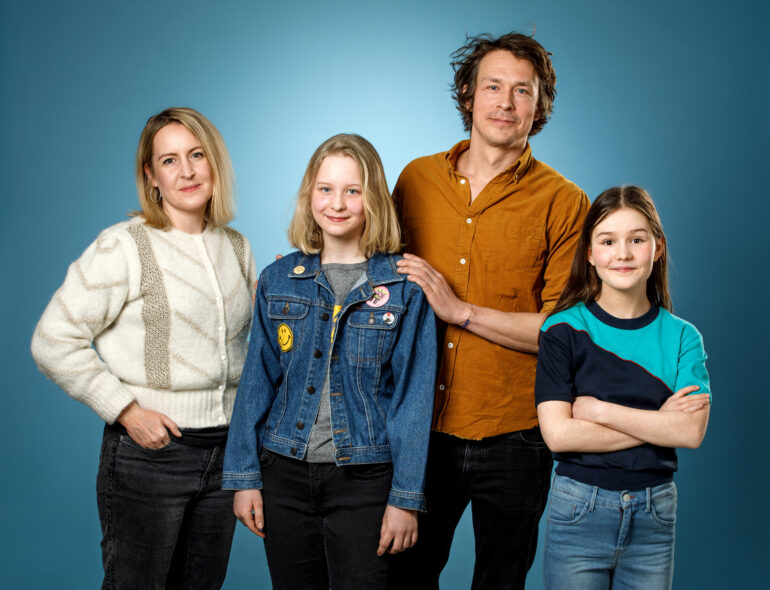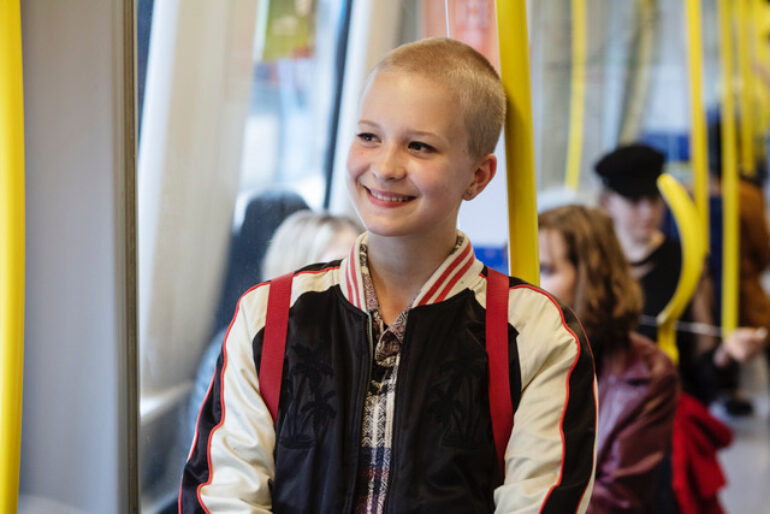Written by: Annika Pham
21.02.22
The Swedish comedy drama which just won a Crystal Bear for Best Film at Berlin’s Generation Kplus is currently playing in Swedish cinemas via SF Studios.
Lenken has directed the film My Skinny Sister (Berlinale Crystal Bear 2015) and the series Thin Blue Line, as concept director and Thunder in My Heart, as episodic director.
Based on Jenny Jägerfeld’s best-selling novel adapted for the screen by Linn Gottfridsson, the film centres on 13-year-old Sasha (Sigrid Johnson) who is grieving the passing away of her mother and determined to make her father laugh again-and everyone else. Sasha who hasn’t yet been able to shed the liberating tears part of the grieving process, puts together a ‘survival’ list that she follows to the letter: shave her hair, stop reading books, say no to the world's cutest puppy and above all, become a Comedy Queen.
In the title roles as Sasha is newcomer Sigrid Johnson. Her father Abbe is played by Oscar Töringe (Thin Blue Line, Top Dog).
The film was produced by Anna Anthony and Rebecka Lafrenz for FLX, with support among others from Nordisk Film & TV Fond. The film premiered in Sweden on February 11.
REinvent handles world sales.
How was it to compete with the film in Berlin and to pick up a second Crystal Bear 7 years after you won with My Skinny Sister?
Sanna Lenken: It was an amazing screening in Berlin-the first time I went abroad again in almost two years! So just to go to Berlin was fantastic. I attended with my producers, the main actors and scriptwriter. I will always remember the screening. I hadn’t watched the film with an audience before because I had Covid-when we had the premiere in Sweden and couldn’t attend. It was very moving to see the audience’s reaction hear them laugh-feel their palpable emotions. That was the biggest prize ever - to share my film with the audience and taking part in a Q&A with them. But then of course, I am very grateful for the Crystal Bear.
How did you get involved in Comedy Queen?
SL: It was actually FLX producer Anna Anthony who contacted me. We connected quickly. Anna asked me to read the book. I had some of Jenny’s books, but that possibility came at a right moment as I was a bit stuck on a script that I was writing. I needed a break.
So I read Comedy Queen and felt: this is what I want to do. A film about a harsh topic, but tackled with great warmth and humour. I said yes immediately to Anna. Then I thought it would take a while to get the project off the ground, but surprisingly the financing process was rather quick. We were lucky to have scriptwriter Linn Gottfridsson on board. We discussed what we wanted to keep, or change in the film adaptation. Linn’s first draft was very good and we got money quite easily.
The author Jenny Jägerfeld is also a psychologist. Did you consult her on a few occasions to get a better understanding of Sasha’s behaviour?
SL: I met her once before starting shooting. I wanted to present myself and my work, and it was important for me to know that she knew intimately what she was talking about in the book. The story had some personal resonance to her, as it was loosely based on real-life experiences from some relatives. We actually cried when we met. We discussed children and grief, the fact that for an adult, a child’s reaction to grief might not seem logical, but we have to respect that. After that encounter, I felt the whole story was very honest.
Portraying the mother, who has committed suicide, but who is obviously still very much alive in Sasha and her father’s lives, must have been challenging visually…
SL: I had never used this kind of heightened film language before. Usually, my films are anchored in social realism so it was new to me. With my DoP Simon Pramsten, we decided to use subtle, associative and poetic visions, not to make it frightening. It was indeed one of the most challenging parts. When a tragedy has occurred when you start a story, it is tricky to figure how to bring back those past moments, to convey the present sadness of the characters. I felt if this heightened visual device doesn’t work, no one will care enough about the grief that Sasha and her father are experiencing. But it was the right route to go.
Could you discuss cry and laughter? How they are approached in the film in such a subtle way, as Sasha’s way of overcoming grief is through comedy-to make her father stop crying and laugh again. Ultimately they both share a good laugh and cry but out of happiness…
SL: Yes-I loved this about the story. When Sasha has reached the point when she wants to become a comedy queen, emotions-whether laughs or cries-open up in a beautiful cathartic way. With the young actress Sigrid, I would always ask her: are there tears behind your eyes in this scene?
Sigrid gives a very strong performance as Sasha. How did you find her and work with her?
SL: My casting director Catrin Wideryd found her. We always try to find actors who can go very far in certain scenes. Sigrid showed very quickly how far she could go. During her first casting I asked her to shout, scream, cry because I knew this is where I had to go with her. And she did it. Then we asked some possible actors who would play the dad to do a scene with her. Oskar came in and they did an amazing improvised scene together.
I felt safe with Sigrid and she was mature enough to know that acting is a job. With kids, you are never quite sure what goes on in their private life, which is why they can go quite far emotionally. But Sigrid actually wants to be an actress. I guided her and pushed her and she was fine with that.
There is a wonderful chemistry between her and Oscar Töringe who plays her dad. That makes their emotions so real on screen. Did you always have Oscar in mind, as you work with him in the series Thin Blue Line?
SL: Yes. I felt Oskar had the vulnerability I needed. He is also very generous with his acting partners. He was supportive of Sigrid, encouraged her, which is why there was a great connection between them. They played cards, were hanging out together on set; they really became father and daughter during the filming.
What’s next for you?
SL: We’ll start shooting the second season of Thin Blue Line in one month. Then I’m reading a lot of scripts and working on my own script. I haven’t decided yet what will come next.

